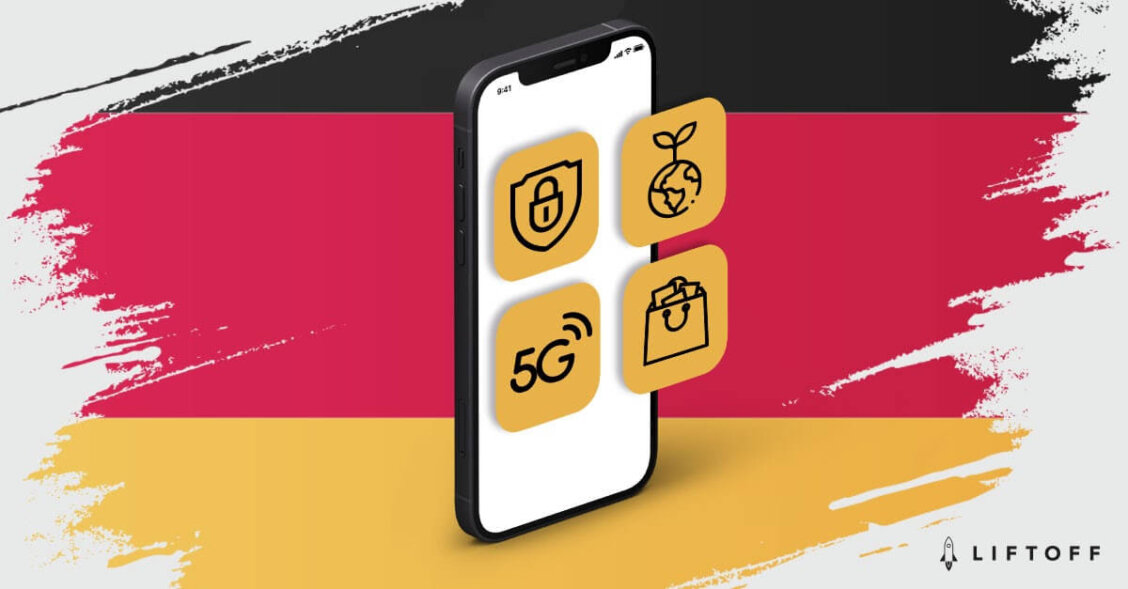
Mobile App Marketing Trends in Germany
Rapid digitization has benefited many kinds of mobile-first businesses, and the story is no different in Germany. In shopping alone, M-commerce sales are expected to increase a remarkable 9.1% to $42.51 billion by the end of 2021, according to eMarketer.
But marketing an app in Germany has challenges not faced elsewhere. The country’s privacy regulations are among some of the strictest in the world, and Germans are particularly protective of their data. Germany also has a reputation for being slow to digitize, but with the introduction of 5G this year, we can expect this to change.
How to navigate and dominate the German app market is a challenge faced by many app marketers. In this article, we’ve outlined some essential tips to promoting your app in the country
Privacy is sacred to the German consumer
Germany was one of the first countries to introduce the General Data Protection Regulation (GDPR) act in 2018, which brought out a host of new legal requirements when handling consumer data. Since then, German consumers have proven willing to report brands that are in breach of these rules. In 2019, leading German property firm Deutsche Wohnen was fined €14.5m for storing data unnecessarily.

Carolin Rohte, Head of Performance Marketing at YAZIO observes: “For Germans, their privacy is sacred – and it’s the same in the digital world. Data privacy may be a topic that affects everyone worldwide, but the German market presents us with very special challenges. Sensitivity, proactive communication and a certain amount of persistence are required”.
Since the introduction of the GDPR, we’ve seen even more change around privacy and data security. The biggest talking point in the digital advertising industry this year was about Apple’s iOS 14.5 update and the depreciation of the IDFA (Identifier for Advertisers).

According to Marian Bucher, Senior App Growth Manager at OTTO, “The importance of data protection has increased enormously in recent years. This applies not only to Germany, but also everywhere in the EU and increasingly to other parts of the world. Most recently, this was highlighted by Apple’s iOS 14 update. As a result, a rethink is taking place in the entire (app) marketing industry. For me personally, this is a very positive development – at least if these new rules of the game really apply to everyone and are followed accordingly. For advertisers, it means that the relationship between advertisements and user behavior is more difficult to measure. But also retargeting users is becoming more and more difficult. As a result, OTTO is heavily focusing on leveraging 1st party data”.
So how can German app marketers successfully maneuver this privacy-centric world?

Sergio Palau, former Online Marketing Manager at FlixBus explains: “Aspects such as how and when to ask for their consent need to be tested. Ideally grab some ideas from other companies that are successful in the market, but don’t take anything for granted. There is definitely a risk of being overly cautious and making it “too easy” for users to decline consent, but at the same time I believe it’s not worth risking the backlash of purposely making it hard for users to manage their data. Most Germans actively opt for less tracking and push back against companies or apps that make it difficult for them to understand what and how much data is being tracked. You need to strike the right balance between maximizing the amount of data you can collect and not infuriating your users.”

Ali Khitab, Senior Programmatic Operations Manager at upday adds: “Due to adhering to data compliance laws more closely, players in the DACH market tend to implement data related work flows more meticulously, resulting in limits to scaling marketing or monetization solutions compared to the broader market. Marketers who are looking beyond cookies and third party targeting by building up first party audiences and channels with publishers will be the winners.”
5G and the rise of mobile video advertising
Germany’s aims to become a global leader in digitalization were accelerated last year when the country introduced 5G technology. Today, 40 million people throughout Germany have access to 5G, and it’s expected that by 2025 it will be available nationwide. 5G is also causing a rise in mobile video advertising spend as more marketers feel confident their messages will be seen. Although the previous 4G network allows advertising messages to be played back to a fairly good extent, advertisers can never be entirely sure whether the users will see the message from start to finish.
Peter Okunev, Digital Marketing Lead at Vinted comments: “Germany’s mobile 4G network was one of the slowest and least reliable in Europe. Last year, 5G was rolled out across the country and now over half the population are benefitting from faster speeds and better connectivity. As a result, we are seeing an increased demand for online video. It is expected that by 2025, videos will account for 76% of all mobile data, a significant increase from the current 60%. We can expect to see a growth in online video advertising spend as brands take advantage of this opportunity.”

Retailers must focus on shopping apps
Smartphones have been popular online shopping devices for many years. But the pandemic has pushed Germans to start using their mobile phones as the primary tool for e-commerce transactions. Research from Statista found that, during the Christmas season 2020, nearly two-thirds (64%) of purchases in Germany were made via either a mobile or tablet device – slightly above the European average of 61%.
Mobile apps are also becoming the preferred way of interacting with retailers among the majority of consumers. Retail marketers have an opportunity to grab market share by focusing on their mobile app offering.
Marian Bucher adds: “From my point of view, the German “shopping app economy” harbors a few surprises. A comparison between the top 10 online shops with the highest turnover in Germany and the top 10 shopping apps (according to the app store ranking) has shown a comparatively small overcut for years. It is evident that many retailers have not yet recognized the signs of the times. This gap is being closed more and more by dynamic players who concentrate almost exclusively on apps. At OTTO we have identified this market trend quite early and thus are investing heavily in our app development as well as in our app promotion activities. For those that lag behind when it comes to shopping apps, it won’t be any easier in the future.”

Bastian Winterkemper, Regional Lead, DACH at Liftoff adds: “Time spent in e-commerce apps grew 49% year-over-year. Traditional Ecom players though have to play catch-up with digital first disruptors. In Germany specifically users spend almost 2x in digital-fist apps, about 43 minutes per month.” [note: data is calculated based on avg. no. of sessions * session duration as per slide 22 of shopping report]
Green marketing and the eco-conscious consumer
Consumers are more mindful of the environmental impact of shopping. Increasingly, they are looking into ways in which they can reduce their everyday effects on the environment. In a 2020 survey conducted by Statista, 8.16 million Germans fully agreed that they would be willing to spend more money on an environmentally friendly product. Environmental issues are gaining more media exposure than ever, making green marketing a bedrock of many brands’ modern marketing strategies.
Alexey Gusev, Lead Performance Marketing at Goodgame Studios comments: “Germany is a rather eco-conscious market, so that does affect the marketing and ecommerce activities as well. More traditional forms of advertising such as print, direct mail or OOH are increasingly being replaced by more eco-conscious digital options. For example, fashion brands are ditching fashion shoots in glossy magazines for user generated content on social media”.

It’s an exciting time for mobile app marketers in Germany. Users are spending more time connected to their devices, meaning more opportunities for brands to engage with them. Those that follow these trends when marketing their apps will stay ahead of the rest.
You can read the original article in mobilbranche.


